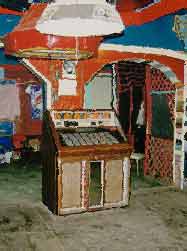
Roots
The thing of it is, is women and men ain't always going to get along.
(John Ruskie explaining why the blues will always exist)
What we know today as the blues came into existence around the turn of the century. Blues music is unique, as it was created without European influence. Africa played a larger role in the birth of the blues. When Africans were forced to board slave ships bound for America they arrived carrying some of their native culture and customs with them. Many forms of musical expression were banned in America. Drumming was banned for fear of rebellion. Old customs were modified and new musical expressions were born. These included "field hollers" or "work songs" where one man would holler out lyrics that were then the other workers would answer with one lyric sung in unison. There were also "jump up songs" that contained lyrics of a religious nature or told stories of "badmen" heroes or bullies that were known by those who sung them. There were strictly religious songs and songster ballads as well.
(H)ollering at each other across the fields, and singing together while working and worshiping, they developed a hybridized musical language that distilled the very essence of innumerable African vocal traditions. (Robert Palmer, Deep Blues, Penguin Books, USA, 1991 p.33)
This new vocabulary was responsible for contributing to the birth of the blues.
Even though blues emerged around 1900 it wasnāt made popular until 1911. The African American man behind the popularization
of the blues was composer W.C. Handy. What was most interesting about the blues was that it did not fit into a
pre-existing musical system. Blues did not obey the European model for tempered pitch. Since itās origins rested
largely in Africa, the blues had to be made to fit into a western musical form. Blues usually form in an AAB pattern
or an AAA pattern. An AAB pattern happens when "each line or thought is stated, repeated, and then answered,"(Palmer, Deep Blues, 42)
I woke up this morning my baby was gone
I woke up this morning my baby was gone
I feel so bad I'm all alone
(B.B. King "I Woke Up This Morning")
An AAA pattern is simply the repeating of the same lyric in one stance.
The thrill is gone
The thrill is gone
The thrill is gone
(B.B. King "The thrill is gone")
What is interesting about the blues is that it contained a flattened third note, which did not previously exist
in America. This note was called a "blue note". This note has no set relationship with those notes that
come before or after it. There are no more than three chords played at a time. Sometimes there is only one chord.
The structure of the blues seems simple, what complicates the blues are the lyrics. The name for blues music came
from the associations with the color blue, that of being in a sullen or melancholy. Blues was born of suffering.
It communicates the pain and suffering experienced by African Americans.
Hear Muddy Waters' "You Got to Take Sick and Die Some of These Days"
Blues vocalized the pain and isolation felt by African Americans. It also maintained the strong oral tradition started in African culture. Other thoughts were voiced as well. Blues lyrics address an array of feelings. These ranged from those of a religious nature to those of a sexual nature.
Hear Robert Johnson's "I Believe I'll Dust My Broom"
Blues lyrics were also used by the musicians to brag. Many bluesmen claimed that they had met, talked with, learned from, or played with the devil. Robert Johnson claimed that he met the devil at the crossroads and he taught him how to play guitar. The crossroads are a highly important symbol in African culture. They symbolize Eshu, an African god who parallels Satan in America. Blues lyrics reveal other connections to Africa as well. In the song "Hoochie Coochie Blues" the lyrics refer to voodoo, a reference back to the Kongo.
I got my black cat bone
I got a mojo tooth
I got a john the Conqueroo
Iām going to mess with you
The items listed in the song are items associated with certain powers in the voodoo faith. The last line is
also a masked warning that he will use these items to get the woman he is meant to be singing the song to, to become
romantically involved with him.
In order to understand the blues as it exists today, we have to examine its roots. For our research we studied
the Mississippi delta blues and Chicago blues.
Delta Blues
 |
The Mississippi Delta consists of the western part of the state. The blues that came from the Delta was considered by many to be Ītrue bluesā because of its immediate connection to African modified musical tradition.
Delta blues has been described as down home or country blues. |
Chicago Blues
Hear B.B. King's "Please Love Me" The changing sound of the blues was reflected in the recording of the time as well. Our group chose to examine how recording affected the blues. |
 |
| History
of Recording Three Artists |
 |